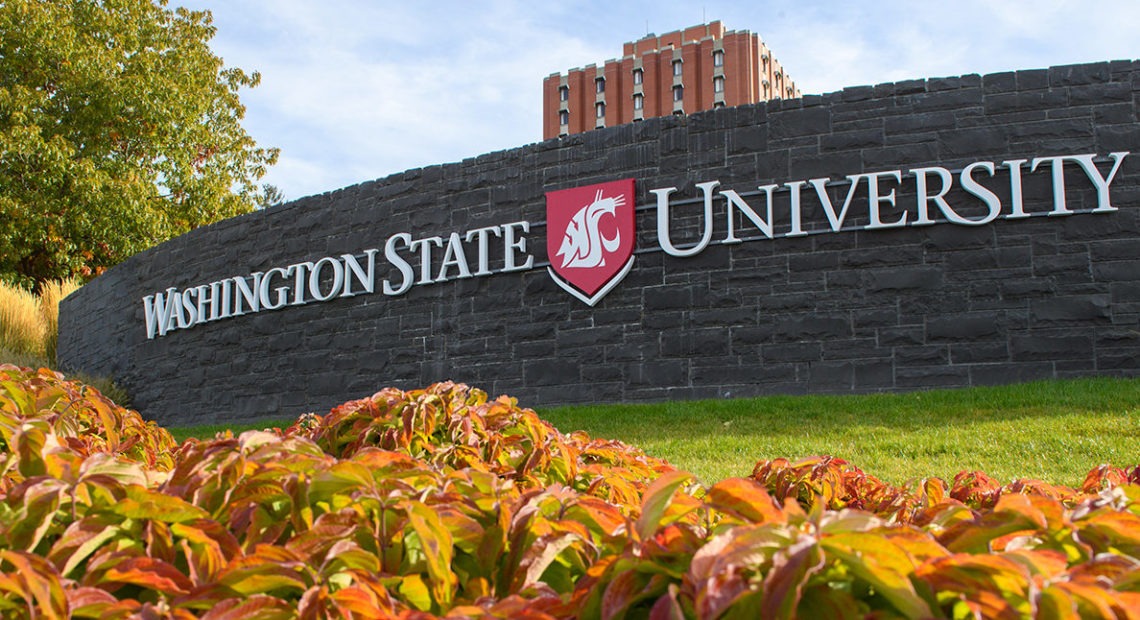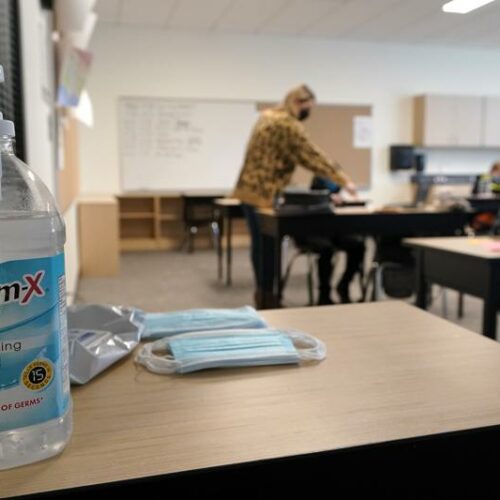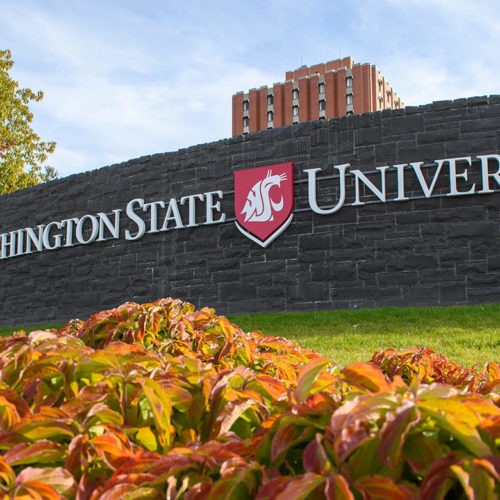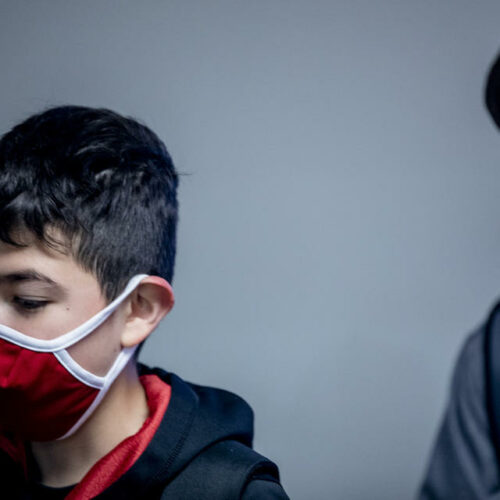
Pullman COVID-19 Cases Continue Rapid Climb. WSU President And Governor Very Concerned
WATCH
Updated Sept. 14, 2020, 3:20 p.m.
The number of COVID-19 cases in Whitman County continues to climb fast. As of Monday, Sept. 14, the county had recorded 1,054 total cases since March, according to the Washington state Department of Health. More than 800 have come since mid-August, mostly in Pullman’s college-age population.
Washington State University decided in late July that this fall semester would be entirely online. But thousands of students are still in Pullman.
President Kirk Schulz says the university is very concerned about the rapid increase in cases.
“Obviously when we see those cases go up every day, you know, we’re worried. Right now, most of, the huge majority of the cases are within shall we say a student population living off campus. And it hasn’t really spread from the student population into the community,” Schulz said recently on NWPB’s Uniquely NW News. (Watch the full interview above.)
A New York Times analysis ranks Pullman among the top five nationally where COVID-19 cases are growing the fastest, adjusted for population. (The more recent numbers put Pullman at the top of the list. But rankings change near daily as counties and states update case counts.) The other places are mostly smaller cities with a large university.
“This is not unique to Pullman. And so it’s something we’ve seen as an issue in many, many places around the country,” Schulz said.
The situation prompted Gov. Jay Inslee to visit Pullman on Sept. 10, where he met with WSU and city officials to discuss the ongoing response. (Inslee was in Whitman County to see the small town of Malden in the wake of a devastating Labor Day wildfire.)
“This is a major threat to the state of Washington right now, on these campuses,” Inslee said Thursday, according to the Spokesman Review.
Inslee expanded on that during a Friday press conference, saying it is a problem even though WSU classes are all online this semester.
“(Students) are congregating in social settings in apartments and homes and transmitting this disease. And it’s a very serious situation,” he said.
The governor said he is encouraged by the response of WSU officials. He said he liked the peer pressure coming from student body leaders who have signs around campus telling people not to be “CO-VIDIOTS.”
In response to the case surge, a mobile unit from WSU’s College of Medicine previously tested students near the Greek Row area. Washington National Guard resources are on site for longer-term testing in the city. WSU’s Cougar Health Services is also offering free testing on campus.
NOTE: Washington State University holds the broadcast license of Northwest Public Broadcasting, but NWPB is editorially independent.
CONVERSATION HIGHLIGHTS: WSU President Kirk Schulz (edited for length and clarity)
On how concerned he and WSU leaders are and what WSU is doing to address it:
We are really concerned obviously when we see those cases continue to go up every day, we’re worried right now. Most of the huge majority of the cases are within, shall we say a student population living off campus, and it hasn’t really spread much from the student population into the community, but we’re concerned about that. We’re monitoring that. We’re working with public health officials on this and we’re ramping up our testing. And I think that’s one of the things that we’ve spent a lot of time on over the last couple of weeks. Cougar Health Services has got their testing set up and operational. And we brought in a mobile unit from the Elson S Floyd College of Medicine. … But I am concerned. Our community’s concerned. Leadership team is concerned. And we’re acting by increasing testing, increase our messaging and working closely with our community to make sure that we keep this as under control as we can.
On the decision for WSU to switch to an online learning model for fall 2020:
What we’re seeing now is what went into that decision. We were preparing and we were pretty vocal in the spring term that we wanted to resume in person operations as much as practically possible for this fall. And that was what a lot of our planning was going on. However, in late July, a couple of our leaders sat down and they said, ” we’ve been working all summer to get us here, but we don’t have the confidence that we can keep everybody safe and in our community and the way that we would like to through Thanksgiving”. It was never, could we make it through part of September or whatever. And I remember meeting, I went around, we had all our deans, we had all our vice presidents, our chancellors, and I asked every single one of them, their thoughts on what we should do. And this was after two months of hard work by everybody into a person, they said, I think we have to go remote. We don’t feel we can keep everybody safe by going in person.
On whether the hit to the budget was part of the decision making for going online:
Yes, we certainly looked at budgetary decisions the whole time. But I would say what we wanted to do was decide what was best for our students, faculty and staff and the community. And then assess what the budget impacts of those different decisions were. But at the end of the day, it came down to we felt that going to remote was gonna be best for faculty and staff, as well as the external community. And we are taking substantial budget reductions because of not having, for example, a full set of resident halls. We’re talking millions of dollars of lost revenue. We’re also talking about student workers, we hired tremendous number of student workers across campus. That’s how personally, how they help pay for their education. And we’re not doing that. It’s kind of this ripple effect. But at the end of the day, if you let the financial part dictate your actions, we felt we were gonna put people’s health and wellbeing in jeopardy. So was that part of our conversation, absolutely. That just wasn’t the most prominent part of conversation.
On how long the budget hits and belt tightening may last:
If I could look at my crystal ball and tell you that I probably have a different job. I would say that, the state of Washington has elected not to do a special session around some of the budget issues. We already have put in place just under $40 million in cuts to the institution going into this next year, based on what we just think the projections are gonna be. When the legislature meets starting in January of ’21, we expect there’ll be some further discussions and decisions about how the financial part’s gonna work. If I look at the last recession and I realized the last recession, and this are very different in some of the economic impacts. But if I use that as at least a data point, higher ed never recovered completely from the cuts that we took in the last recession. We were covered a lot of it, a lot of loss ground, but we were now talking over a decade, it took to sort of get back. I think we’re gonna see some significant impacts over the next two to three years. And I suspect it’ll stabilize out and the question is there a new normal, if you will, that’s out there.
On how university administrators are pitching in, and the significance of someone with a very high salary nearly three quarters of a million dollars taking a 10% salary cut (as he did), versus someone making $50,000:
You mentioned, I took a salary cut as did some of our other highly compensated individuals, coaches, athletic director, things like that. What we were able to do was really control some of the budget issues as next year through not filling positions. And I’m not talking 10 or 15, I’m talking like 250, 275 open positions that will not be filled this next year. At one point, we felt that we might need to do some sort of a furlough plan across the university and due to some of the financial work we’ve done in the last couple of years, we just did not need to do a furlough plan of any type. And some of our senior leadership team, aside from myself and others, were also poised to participate in the same sort of budgetary cuts so that it wasn’t highly compensated administrative folks didn’t see something and our other employees did. And so at that particular point, I said, hey, if we don’t need a furlough, we’re not gonna have to do that this year. There is no reason for anybody to be taking salary cuts. I still feel as president it’s important for me to set an example there. Coaches are highly compensated coaches, the same thing. Several of us still felt that it was important to send a really positive message that way. If we have to do anything in the future, and I’m talking about over the next several years, it will certainly be graduated. The highest paid people should take more of a cut, the lower paid faculty and staff that are in our organization shouldn’t take anything at all.
On how he sees his position and the university’s responsibility in supporting the broader Pullman community:
We’ve worked hard during my tenure as president to really build really outstanding relationships with the Pullman business community, with our town council, with the chamber of commerce and the hospital and other types of things as being not to participate in growth and wanting to work more closely together as a big employer. If we do something and we start something, it can have ripple effects on small business. We’re really trying hard to do that. With COVID-19 it’s been tough, right? People are used to a large population here spending money, parents coming to visit, football weekends, things like that. The decisions that we’ve already made about remote instruction and that have already had. I would say a really challenging economic impact on Pullman itself. Add the COVID-19 challenges and the testing and things on top of that. And there’s certainly some tension now with our community members and WSU about why can’t you control students? Why are we seeing this spike? We went all summer. We had weeks we added probably two to three positive tests in a whole week in Whitman County. Now we’re adding 40 or 50 a day. There is some anger, resentments, feeling that if we’d had our act together or done something differently that we could have prevented this. I don’t think that’s the case, but on the other hand, we’re gonna continue to build those relationships, continue to work with the community, work with the mayor, be open and transparent and problem solve together.
Related Stories:

State Says All Washington Public Schools Must Open In Full For Fall, With Masks Required
Washington authorities said Thursday all schools in the state must provide full-time, in-person education for students for the 2021-22 school year and that students and staff will still be required to wear masks.

Context And Clarity On WSU’s Fall 2021 COVID-19 Vaccine Requirement
WSU’s vaccine requirement comes with some major exceptions. Medical and religious exemptions have existed for vaccinations on campus for decades, but this time around, WSU is adding a “personal exemption,” and following that announcement, provided some clarity on exactly what that means.

Some Washington School Districts Are Depending On Federal Relief Money To Pay For Reopening
Without emergency hires, the Moses Lake School District would not have the staffing necessary to comply with the Washington State Department of Health’s reopening guidelines, according to district Superintendent Dr. Joshua Meek. They are essential to the district’s reopening, he said.















